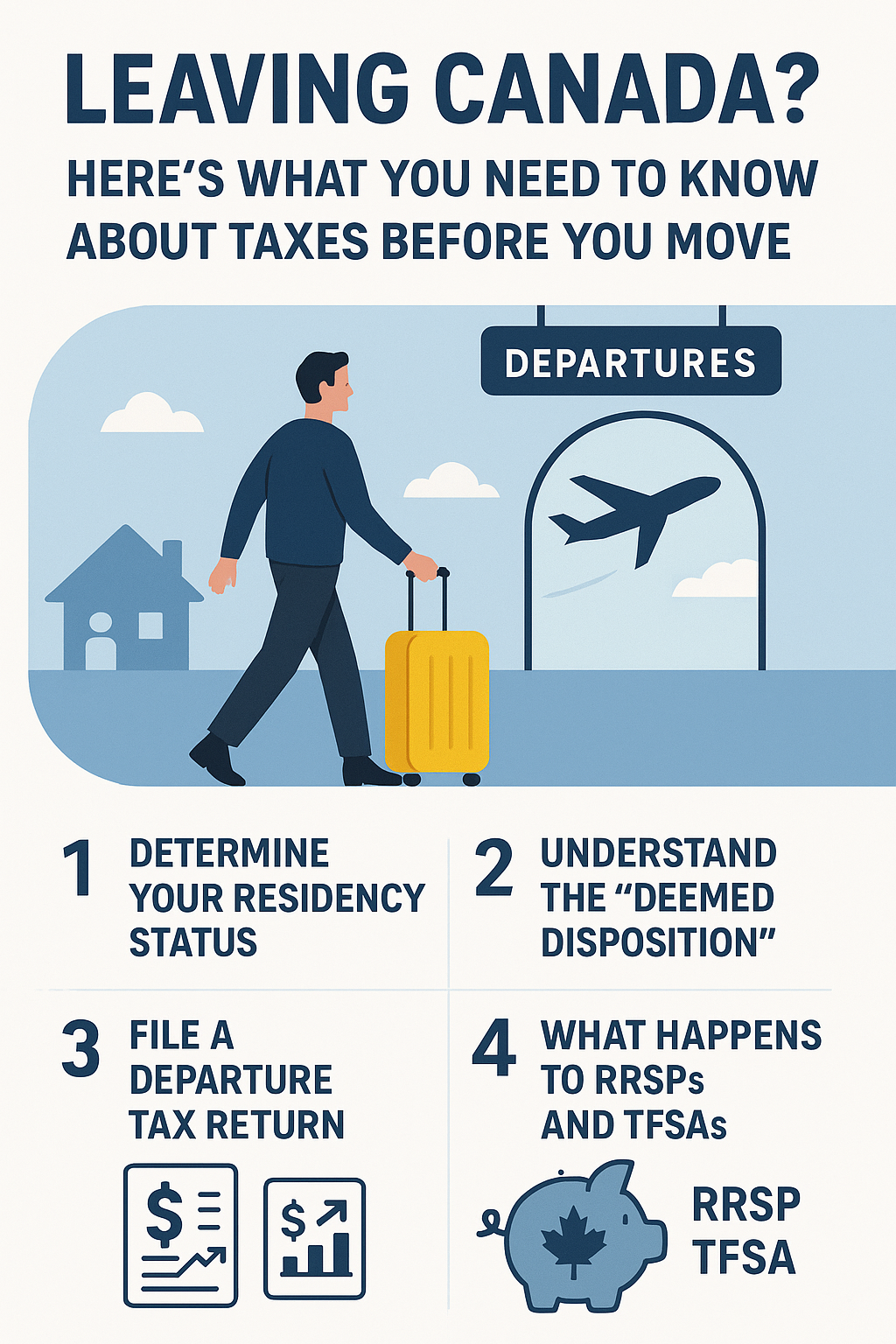
Thinking about moving abroad? Whether it’s for work, family, or a new adventure, leaving Canada comes with more than just packing boxes, it also means wrapping up your tax life here.
Before you go, it’s important to make sure the Canada Revenue Agency (CRA) knows you’re leaving and that your taxes are handled properly. Here’s what you need to know to leave Canada with peace of mind and without unexpected tax bills following you abroad.
1️⃣ Are You Still a Resident for Tax Purposes?
CRA doesn’t decide residency based on how long you’ve been away, it’s about your residential ties.
If you still have a home, a spouse, or dependents in Canada, or if you keep your bank accounts and health coverage here, CRA might still consider you a resident.
When you break those ties – sell your home, move your family, establish a new residence abroad – that’s when you usually become a non-resident for tax purposes.
2️⃣ Understand the “Deemed Disposition” Rule (Your Exit Tax)
When you officially become a non-resident, CRA treats it as if you sold most of your assets on the day you left, even if you didn’t sell anything!
This is called a deemed disposition, and it can trigger capital gains tax on things like:
- Stocks and ETFs (exchange-traded funds)
- Mutual funds or other investments
- Certain personal property
You don’t need to report deemed disposition for your RRSP, TFSA, or Canadian real estate.
If the total value of your property exceeds $25,000, you must file “List of Properties by an Emigrant of Canada” with your final return.
3️⃣ File a Final (Departure) Tax Return
You will file a departure return for the year you leave Canada.
This return reports all income up to your departure date and includes any deemed capital gains.
If you owe tax on these gains, you can request defer payment by filing special form and providing security to the CRA.
4️⃣ What Happens to RRSPs, TFSAs, and Other Accounts
- RRSP/RRIF: You can keep them in Canada, but withdrawals are subject to a non-resident withholding tax (usually 25%).
- TFSA: You can keep it, but no new contributions are allowed once you become a non-resident.
- RESPs: You can remain a subscriber, but new contributions may have limited benefits depending on your new country.
5️⃣ Tie Up Loose Ends Before You Go
Before leaving:
- Update your address with CRA and Service Canada
- Inform your bank or investment firm of your non-resident status
- Cancel or adjust provincial health coverage
- Review any Canadian-source income (like rent or dividends), which may now be subject to non-resident withholding tax.
6️⃣ Keep Documentation
The CRA may ask for proof of your move or asset values years later. Keep:
- Copies of your visa, employment contract, or home sale documents
- Investment statements showing fair market value on your departure date
- Copies of filed forms and your departure tax return
✈️ Ready to Move? Let’s Make It Smooth.
Leaving Canada is exciting, but your taxes don’t have to be complicated.
With proper planning, you can minimize your departure tax, stay compliant, and start your new life abroad worry-free.
If you’re planning to leave Canada soon or have already moved, we can help you:
- Calculate your deemed disposition
- File your departure return
- Ensure all your CRA forms are submitted correctly
Contact us today www.staccounting.ca or info@staccounting.ca
and schedule consultation and make your move the right way.
.
